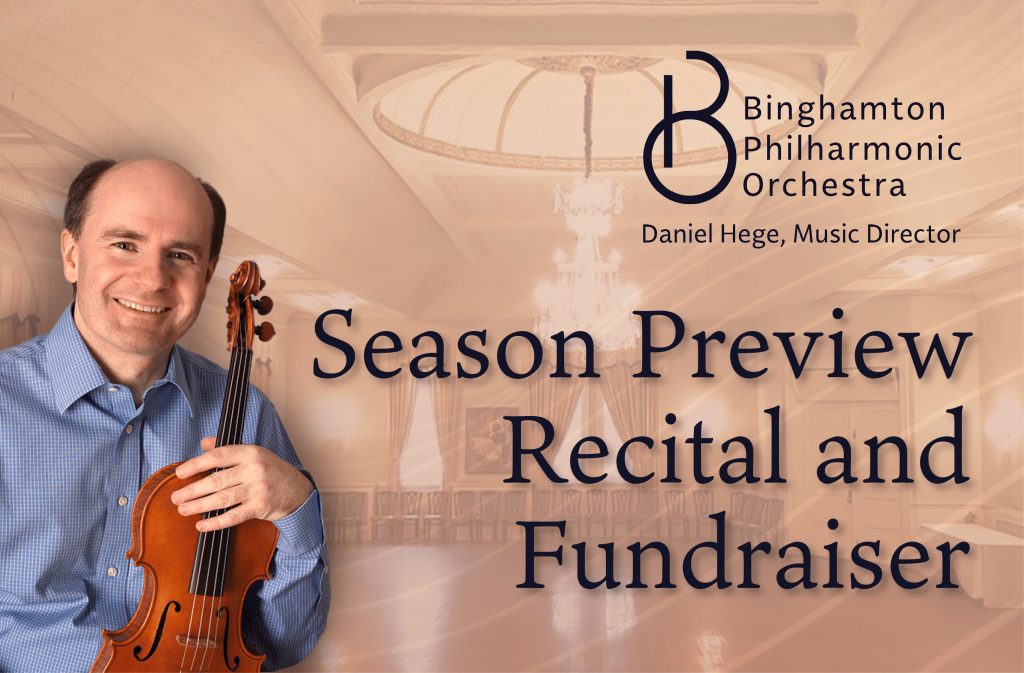On Sunday, the Binghamton Philharmonic Orchestra (BPO) held a Season Preview Recital at the Phelps Mansion Museum.
The program featured violinist Uli Speth, BPO’s concertmaster, and pianist Tomoko Kanamaru, BPO’s principal pianist. The recital included music that spanned from various musical periods. The program began with Ludwig van Beethoven and concluded with George Gershwin.
The Season Preview Recital was sponsored by Garufi Law P.C., and functioned as a way for BPO to preview composers that would be featured in the 2022-2023 season. The recital was also a fundraiser for BPO. Purchased recital tickets, as well as basket raffle tickets, helped raise over $5000 to support BPO.
Beethoven’s early piano sonatas, “Sonata in E-flat Major, Opus 12, No. 3,” began the recital program. This sonata showed elements of the galant style, typical in classical era music. Mozart’s influence on the composer comes through in this early period of Beethoven’s life. The “I. Allegro con spirito,” “II. Adagio con molta espressione” and “III. Rondo: Allegro molto” were heard and showed the classical period style — the music was simplistic, elegant and relaxing.
The second sonata in the program, Lera Auerbach’s “Sonata No. 2, Op. 63 ‘September 11,’ (2001),” was inserted to commemorate the victims of 9/11. Paul Cienniwa, executive director of BPO, who has a doctorate in music, took a moment to acknowledge the tragedy.
“On this anniversary of the Sept. 11 terrorist attacks, let’s have a moment of silence for those who lost their lives,” Cienniwa said.
This sonata began with much dissonance, intensity and highly contrasting sounds. The music reflected the attacks by incorporating quick, dynamic changes from piano to forte. The instrumentalists made quick changes in volume that surprised audience members. These sudden changes in the music were meant to reflect the terror that came with the 9/11 attacks. Audience members felt the sense of not knowing what was coming next.
After “L’Alouette (The Lark)” by Mikhail Glinka, transcribed by Leopold von Auer, there was an intermission where audience members could purchase raffle tickets. Following intermission, works by Edvard Grieg and Pyotr Ilyich Tchaikovsky were played. The program came to an end with well-known works by Dmitri Shostakovich, Leonard Bernstein and Gershwin.
While Speth and Kanamaru played “The Second Waltz” by Shostakovich, audience members swayed and hummed to the well-known tune. The waltz was transcribed for piano and violin by Diego Marani and was a great segway to the popular song “Somewhere” from West Side Story by Bernstein. The final piece included arias from Gershwin’s opera “Porgy and Bess” transcribed by Jascha Heifetz.
Speth described the process that went into programming the recital. Specifically, he mentioned the research involved in creating a flowing program.
“So programming started really at the beginning of the summer,” Speth said. “We thought about what pieces would go into it and how to relate it to the season.”
Speth said that, while researching, he came across Bernstein’s “Somewhere” — arranged by Raimundo Penaforte — for piano and violin. He had the option to listen to a recording and purchase the music. Speth said that the Bernstein transcription was the most recent one, as works often have dated transcriptions.
“The most recent one was the Bernstein,” Speth said. “It was actually a gentleman I know who arranged it … So that was done maybe 10 years ago. Others are much older.”
Speth said he was first welcomed to Binghamton in 2005. He noted that there was an appreciation for artistry within the Binghamton community. Speth spoke of his experience as the concertmaster in BPO.
“There’s a sense of community here and people embrace good artistry, so I’ve always felt very welcome here,” Speth said.
The fundraising event concluded with a basket raffle, where multiple gift baskets were donated by local organizations, clubs, businesses and restaurants — including Tom’s Coffee Cards & Gifts and Kampai Japanese Steakhouse. After raffle winners were announced, there was a reception with different types of cakes.
Audience members had the opportunity to interact with musicians during the reception as they indulged in sweet treats. Cienniwa said the event offered audience members the opportunity to experience music on a smaller scale and in a more intimate setting.
“It’s not only a way for people to be together on a smaller scale but [it’s] also the opportunities to interact with the musicians are even greater,” Cienniwa said. “The natural intimacy of chamber music makes for a very different experience than in the big concert hall.”
Cienniwa said that, in a post-COVID-19 world, people yearn to come together as a community. He stated that organizations are still nervous to host events, but described the positive results BPO received by hosting a more intimate music event.
“We sold out,” Cienniwa said. “That’s incredible, I mean really and what a way to start our season. This is more than music. This is more than a fundraiser. This is also a communion of people coming together and having a shared experience.”



